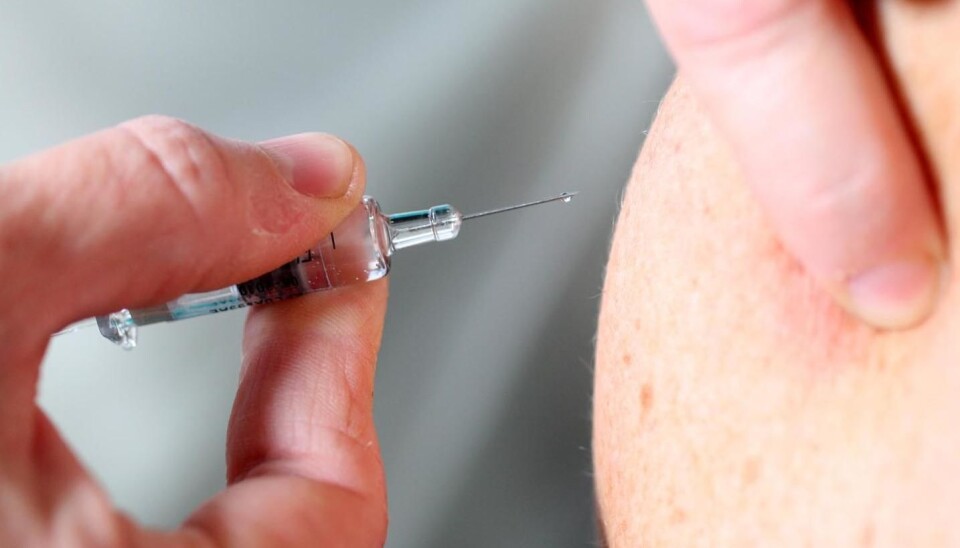
Injections cut fat
A new slimming product can help grossly overweight people lose weight through a daily injection. Their weight loss persists after two years and there are very few side-effects, trials show.
One quick jab a day can be the new weapon in the fight against obesity and gross overweight.
This is the result of trials with a new slimming product called Liraglutide, which, unlike many other slimming products, is injected into the body.
The new medicine has been developed by Danish healthcare company Novo Nordisk and has just been tested by European researchers. The results were published recently in the scientific publication, the International Journal of Obesity.
“The results after the Phase II clinical trials show that a daily injection of Liraglutide gives a lasting weight loss and is virtually without side-effects,” says Professor Arne Astrup MD, head of the Department of Human Nutrition at the University of Copenhagen. He is one of the researchers who headed the large study.

As well as reducing a patient’s waist measurement, the medicine has also shown the ability to cut obesity-related factors such as blood pressure and cholesterol, which are associated with cardio-vascular diseases.
In addition, the results indicate that the medicine can give a pronounced reduction in the risk of diabetes by reducing the occurrence of overweight people with prediabetes, a preliminary stage of type 2 diabetes.
Drug stimulates the feeling of being sated
Liraglutide is a drug based on the natural hormone GLP-1. It was originally developed by Novo Nordisk to treat patients with type 2 diabetes, but in addition to giving an improved control of blood sugar it was shown that slightly higher doses of the drug also give an increased feeling of being sated.
“That is the function of the natural hormone GLP-1,” explains Astrup. “The problem is that the naturally occurring hormone decomposes in the blood again and disappears after a few minutes. But here, Novo Nordisk as been successful in modifying the hormone slightly, so that it does not decompose as quickly.”
No serious side-effects
Clinical trials show that a daily injection of Liraglutide gives a lasting weight loss and is virtually without side-effects.
According to Astrup, the new slimming product does not have the side-effects that many other slimming products are criticised for.
“We have for instance seen that other slimming products give an increased risk of depression and have a negative effect on cholesterol, but Liraglutide does not cause any of these problems,” he says.
On the whole, the trials with the new slimming product show that it has few side-effects.
“In the first study we could, in broader terms, see a little increase in the pulse,” says Astrup. “But the pulse fell again in treatment over a longer period, and that is a good sign.”
Just about all the other apparently promising slimming products have been withdrawn from the market or in the last phases of development. There is virtually only Liraglutide left – but that does look like a really good treatment.
He says that 15 percent of the people in the trial had symptoms such as nausea and vomiting when receiving the highest dose of the drug, but after some weeks that fell to 10 percent.
But the nausea is related to the dose, which means that patients with nausea can reduce the dose and still achieve weight loss without feeling nausea.
Weight-loss continues after two years
In the study, 564 obese or grossly overweight test subjects were randomly selected to take either the new medicine Liraglutide, a placebo or Orlistat, an active ingredient that prevents enzymes decomposing fat in food.
The study was double-blind during its first year, which means that during the first period neither the participants nor the researchers knew who received Liraglutide, the active ingredient or the placebo.
The test subjects were given a daily injection over a period of 20 weeks, while at the same time they were on a diet and exercised. After the 20 weeks the study was prolonged to two years. At this time, 398 test subjects started on the prolonged study and 268 completed the study.
After a year, the test subjects who had been given Liraglutide lost 5.8 kg more in weight overall than the test subjects who were given the placebo, and 3.8 kg more than those on Orlistat.
After two years the result was that the test subjects on Liraglutide had on average lost 3.0 kg more in weight than those on Orlistat.
Generally, the participants on Liraglutide maintained a weight loss of 5.3 kg after two years. The occurrence of prediabetes in this group fell by 52 percent and the occurrence of metabolic syndrome fell by 59 percent.
Only for grossly overweight people
Liraglutide will be a prescription-only medicine. It will only be prescribed for treating gross obesity – which means cases where the patients have considerable health problems in connection with their weight and are unable to lose weight in other ways – and it will be used in conjunction with a diet and changes in patients’ lifestyles.
“A Liraglutide treatment will be a serious step to take with regard to weight loss,” says Astrup. “This is due to the principle of not treating healthy people with drugs. Personally, I believe that treating a couple of kilos of excess weight with drugs is a dangerous practice. A change of diet and the support of a dietician can easily deal with that problem.”
By this he means that it is an advantage that Liraglutide is given as an injection, rather than as a pill, because the risk that the drug will be prescribed to slightly overweight patients who want help before the start of the bikini season will be smaller.
“One can say that if the alternative is a stomach operation then it’s better to have a daily injection. But history has taught us that it is sometimes only when a drug has been on the market for many years that you discover that it has rare but serious side-effects.
“That’s not so important if you’ve been treating ill people who have benefited from the treatment, as this can justify running that small risk. But it is not OK for people who are not ill but who are a couple of kilos overweight.”
Astrup says that he will receive no money even if the drug becomes a blockbuster, but he does sit on the advisory board at Novo Nordisk and has previously held talks that Novo Nordisk has paid him for.
Professor gives study a mark of quality
This prompted Sciencenordic.com to ask another professor of pharmacology, Thue W. Schwartz, to assess the study.
He is a professor at the Department of Neuroscience and Pharmacology at the University of Copenhagen and was the head of research at 7TM Pharma, a biotech company that is very active in discovering and developing drugs against obesity.
“This is a good study and a very interesting potential new treatment for obesity, with a quite well-documented weightloss effect,” says Schwartz.
“Just a few years ago, not many people, including Novo Nordisk, believed that injection drugs against obesity would be relevant,” he says. “But in the meantime just about all the other apparently promising slimming products have been withdrawn from the market or in the last phases of development. There is virtually only Liraglutide left – but that does look like a really good treatment.”
Novo Nordisk says it has recently started testing Liraglutide in a series of extensive Phase III tests. If these trials go according to plan, we can expect to see Liraglutide on the market around 2015.
Read the article in Danish at videnskab.dk
Translated by: Michael de Laine








